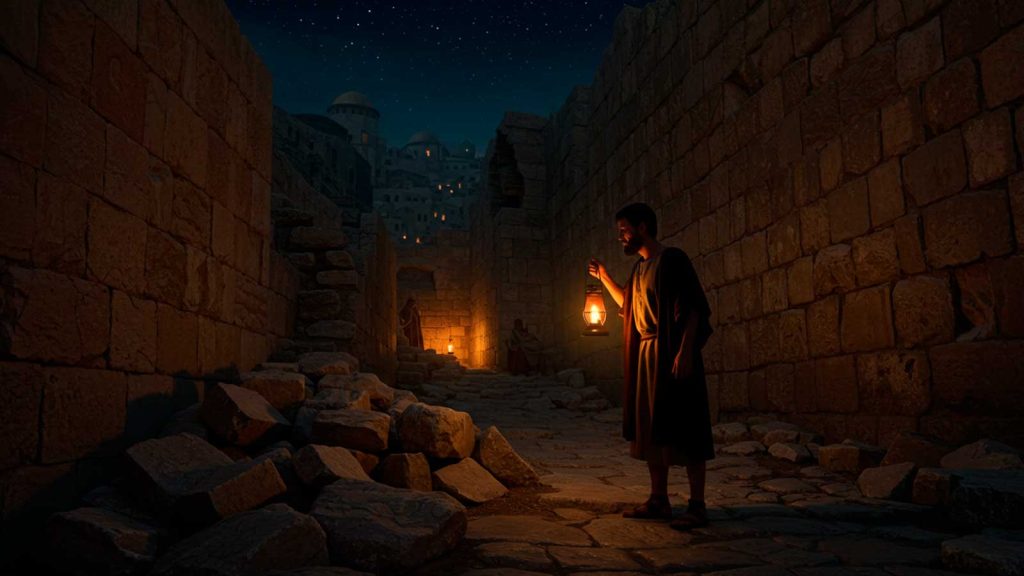Nehemiah 2 is one of the most striking chapters in the Old Testament. It shows how the faith, strategy, and determination of one man could transform the history of a nation. Although Nehemiah was only the king’s cupbearer, he was used to lead the rebuilding of Jerusalem’s walls, bringing hope to a people who lived in shame and vulnerability.
This chapter reveals profound truths about leadership, planning, and perseverance that remain relevant today. Throughout this study you will learn in detail what happened in Nehemiah 2 and how to apply those lessons to your own life.
Nehemiah 2
¹ And it came to pass in the month of Nisan, in the twentieth year of King Artaxerxes, when wine was set before him, that I took up the wine and gave it to the king. Now I had never been sad in his presence before.
² So the king said to me, “Why is your face sad, since you are not sick? This is nothing but sorrow of heart.” Then I was very much afraid,
³ and I said to the king, “May the king live forever! Why should my face not be sad, when the city, the place of my ancestors’ graves, lies in ruins and its gates have been destroyed by fire?”
⁴ Then the king said to me, “What is your request?” So I prayed to the God of heaven,
⁵ and I said to the king, “If it pleases the king, and if your servant has found favor in your sight, send me to Judah, to the city of my ancestors’ graves, so that I may rebuild it.”
⁶ Then the king said to me—the queen also sitting beside him—“How long will your journey be, and when will you return?” So it pleased the king to send me, and I set him a time.
⁷ I also said to the king, “If it pleases the king, let letters be given to me for the governors of the region beyond the River, that they must permit me to pass through until I come to Judah;
⁸ and a letter to Asaph, keeper of the king’s forest, that he must give me timber to make beams for the gates of the citadel by the temple, for the city wall, and for the house that I will occupy.” And the king granted them to me according to the gracious hand of my God upon me.
⁹ Then I went to the governors beyond the River and delivered the king’s letters. The king had also sent with me army officers and horsemen.
¹⁰ When Sanballat the Horonite and Tobiah the Ammonite servant heard of it, they were very displeased that someone had come to seek the welfare of the children of Israel.
¹¹ So I came to Jerusalem and was there three days.
¹² Then I arose in the night, I and a few men with me; I had told no one what my God had put in my heart to do for Jerusalem. There was no animal with me except the one on which I rode.
¹³ And I went out by night through the Valley Gate toward the Dragon Spring and the Dung Gate, and I inspected the walls of Jerusalem that were broken down and its gates that had been destroyed by fire.
¹⁴ I went on to the Fountain Gate and to the King’s Pool, but there was no place for the animal that was under me to pass.
¹⁵ So I went up the valley by night and inspected the wall. Then I turned back and entered by the Valley Gate, and so returned.
¹⁶ The officials did not know where I had gone or what I was doing; I had not yet told the Jews, the priests, the nobles, the officials, or the others who did the work.
¹⁷ Then I said to them, “You see the trouble we are in: Jerusalem lies in ruins, and its gates are burned with fire. Come, let us rebuild the wall of Jerusalem, so that we will no longer be a disgrace.”
¹⁸ And I told them of the hand of my God that had been good upon me, and also the words that the king had spoken to me. Then they said, “Let us rise up and build.” So they strengthened their hands for the good work.
¹⁹ But when Sanballat the Horonite, Tobiah the Ammonite servant, and Geshem the Arab heard of it, they mocked us and despised us, and said, “What is this thing that you are doing? Will you rebel against the king?”
²⁰ So I answered them and said, “The God of heaven will give us success. Therefore we, His servants, will arise and build; but you have no share, right, or memorial in Jerusalem.”

The Historical Setting of Nehemiah 2
To understand Nehemiah 2, you must know the context of the people of Israel: Jerusalem was destroyed and its walls torn down, exposing the city to shame and danger. The exile had ended, but the restoration was far from complete.
Who Was Nehemiah?
- King Artaxerxes’ cupbearer, a trusted position in the Persian court
- Exiled Jew with access to resources and influence
- Man of faith and prayer, sensitive to his people’s suffering
Even from afar, Nehemiah felt responsible for Jerusalem and was moved by compassion and faith to act.
Why Were the Walls So Important?
- They guaranteed security against enemies
- They symbolized Israel’s dignity and identity
- They represented physical and spiritual restoration
The absence of the walls was an open wound for the people, and Nehemiah knew that restoring them was more than a construction project: it was a mission to restore the nation’s honor.
Nehemiah’s Boldness Before the King
One of the central points of Nehemiah 2 is Nehemiah’s meeting with Artaxerxes. Appearing sad before the king was dangerous, as it could be interpreted as disrespect. Even so, Nehemiah did not hide his grief.
The Dialogue That Changed Everything
- The king noticed Nehemiah’s sadness
- Nehemiah explained that his heart was afflicted for Jerusalem
- With courage, he asked permission to rebuild the walls
- He requested letters of support and resources for the work
The Secret Behind Nehemiah’s Success
Nehemiah not only spoke boldly but also planned every detail before the conversation. He knew the opportunity would be unique and came prepared with a clear list of needs.
Prayer Before Answering
Even before the king, Nehemiah offered a silent prayer, asking for God’s direction. This combination of spiritual dependence and planning is one of the great lessons of Nehemiah 2.

The Arrival in Jerusalem and the Nighttime Survey
Nehemiah traveled to Jerusalem with the king’s letters and chose a strategic moment to assess the state of the walls.
Why Did Nehemiah Act in Silence?
- He avoided drawing attention from opponents
- He needed to know the details before presenting a plan
- He showed prudence and wisdom in his leadership
What Did Nehemiah Observe?
During the nighttime inspection, Nehemiah went around the walls and grasped the extent of the damage. This allowed him to:
- Plan precisely every part of the rebuilding
- Identify resources and teams needed
- Motivate the people with clear information about the challenges ahead
How Nehemiah Motivated the People
After the inspection, Nehemiah gathered the city’s leaders and residents to share the reconstruction plan.
Strategies to Inspire Confidence
- He spoke of God’s hand guiding the mission
- He shared the king’s approval
- He showed that the work, though challenging, was possible through unity
The People’s Response
The inhabitants of Jerusalem, previously discouraged, responded with enthusiasm: “Let us rise up and build.” The confidence awakened in Nehemiah 2 was the fuel that launched the great work.
The Opponents in Nehemiah 2
No important project is free from resistance. Sanballat, Tobiah, and Geshem mocked and tried to intimidate the workers.
How Did Nehemiah Deal with Opposition?
- He declared confidence in God: “The God of heaven will give us success.”
- He ignored provocations and threats
- He kept focus and encouraged the people to continue
Lessons for Handling Criticism Today
- Do not respond to attacks with anger
- Trust in your purpose and keep working
- Strengthen your team so that discouragement does not prevail

Leadership Lessons from Nehemiah 2
Nehemiah 2 teaches that true leadership goes beyond titles or positions. It is about serving, inspiring, and acting wisely.
Five Characteristics of Nehemiah as a Leader
- Sensitivity: he cared about the people’s pain
- Constant prayer: he sought God’s direction at every stage
- Careful planning: he prepared requests, resources, and strategies
- Courage in the face of risk: he spoke to the king and faced opponents
- Ability to unite people: he turned discouragement into cooperation
How to Apply These Principles
You can apply these lessons in:
- Community projects
- Rebuilding relationships or businesses
- Situations that require resilience and vision
The Importance of Waiting for the Right Time
Nehemiah did not act impulsively. He waited months until the ideal moment to present his request to the king.
The Value of Waiting for the Right Moment
- It allows calm planning
- It increases the chances of success
- It prevents hasty decisions that could compromise the mission
This strategic patience in Nehemiah 2 reminds us that great projects require preparation and discernment.
The Connection Between Faith and Action in Nehemiah 2
Nehemiah did not rely only on prayer nor solely on human strategies. He combined both, showing that faith does not exclude planning.
Why Is This Combination Powerful?
- Prayer brings direction and peace
- Planning organizes resources and goals
- The union of both strengthens confidence and increases the likelihood of success
Practical Applications for Today
The lessons of Nehemiah 2 remain relevant and can be applied to various areas of life.
How to Apply the Teachings in Daily Life
- When you need to rebuild something lost, pray and plan
- Seek support from trustworthy people to reach goals
- Do not be discouraged by criticism; stay focused
- Inspire others with your example of faith and determination
What We Learn About Perseverance
Nehemiah faced risks, opponents, and great challenges, but he did not give up. His perseverance is a model for anyone who must face difficulties and keep moving forward.
Frequently Asked Questions About Nehemiah 2
What Does Nehemiah 2 Teach About Leadership?
It shows that a leader must combine faith, planning, and courage to inspire and mobilize people toward a common goal.
Why Did Nehemiah Inspect the Walls at Night?
To act prudently, understand the challenges without opposition, and prepare a solid plan before announcing it to the people.
How Did Nehemiah Keep the People Motivated?
He pointed out that God was guiding the project, showed the king’s support, and conveyed confidence that the work was achievable.
What Should We Do When We Face Opponents, Like Nehemiah Did?
Stay focused, trust the purpose, strengthen those at your side, and do not allow criticism to paralyze you.
Conclusion – Nehemiah 2
The chapter of Nehemiah 2 is a true manual on how courage, faith, and planning can transform seemingly impossible situations. Nehemiah’s story shows that no matter our position or the obstacles we face, when we unite dependence on God with preparation and action, great changes can happen.
The way Nehemiah prepared, sought support, prayed, and led teaches that restoring something broken—whether a city, a project, or a relationship—requires determination and hope. More than a historical account, Nehemiah 2 invites each person to face challenges with wisdom, trust in divine care, and move with purpose toward rebuilding what needs to be restored.
READ ALSO:
- Exodus 1: How the Liberation of the Hebrew People Begins
- Genesis 27: The Deception of the Blessing and Its Consequences
- Ark of the Covenant: 7 Facts to Understand Everything
- Exodus 25:18: The Deep Meaning of the Cherubim on the Ark of the Covenant
FOLLOW US ON FACEBOOK
I hope this has helped.